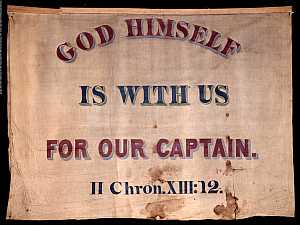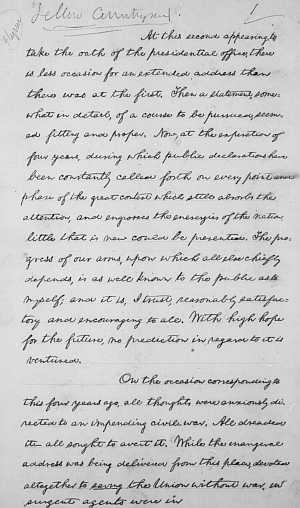Our Captain
Introduction
Throughout history, people have used God's name to justify their actions. Both sides of the slavery debate proclaim that God is on their side, from Frederick Douglass to slaveholders in the South. President Abraham Lincoln is a little less sure that God takes sides. This copy is believed to be the one the President read from during his Second Inaugural Address.
Documents
Questions to Consider
CONTENT:
- Can you tell, just from the text, what cause this banner supports? Each side of the debate believes that God is on his side. Why?
- What is the occasion and the main message of this speech to the nation?
CONTEXT
- Why do the abolitionists believe that God is with them in their crusade to end slavery?
- Why is this speech so different from Lincoln's first inaugural address? How has the situation in the country changed in the four years between the speeches?
CONSIDERATIONS:
- Discuss the religious terminology and why the abolitionists use it on behalf of their cause.
- How and why does Lincoln refer to God in his address to the country? What does he mean by "with firmness in the right, as God gives us to see the right"?
CONVERSATIONS:
- Comment on the banner's effectiveness from a visual perspective. Color, font, font size, word placement, banner size, use of images or not, etc., are all choices that need to be considered.
- Why would the great orator Frederick Douglass call this speech "a sacred effort" and say that it sounded "more like a sermon than like a state paper"?
CONNECTIONS:
- What can you tell about the character of abolitionists such as William Lloyd Garrison from this banner? What is your evidence?
- What can you tell about the character of Abraham Lincoln from the tone and words of this address? What is your evidence?
- In your opinion, when is it right to be uncompromising? When is it right to be forgiving? How could these two documents help us to explore the dimensions of this dilemma?
 Selection from the Massachusetts Historical Society: God Himself is with Us for Our Captain..., Cotton banner, [1840s].
Selection from the Massachusetts Historical Society: God Himself is with Us for Our Captain..., Cotton banner, [1840s]. Selection from the Library of Congress: Abraham Lincoln, [March 4, 1865] (Second Inaugural Address; endorsed by Lincoln, 10 April 1865).
Selection from the Library of Congress: Abraham Lincoln, [March 4, 1865] (Second Inaugural Address; endorsed by Lincoln, 10 April 1865).